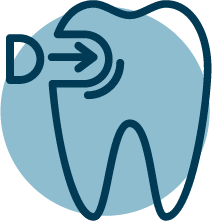
Baker & Graham
Overview
Preventative dental care is essential for everyone. By practicing good oral hygiene at home and scheduling regular checkups with your dentist, you can help keep your smile bright and healthy for many years to come. Here are our most common preventative treatments, as well as a few simple ways that you can manage your oral health at home.
Regular Exams and Cleanings
Regular exams are an important part of maintaining your oral health and your total body health. During your regular exam, we will check for any problems that you may not be able to see or feel, look for cavities and other signs of tooth decay, inspect your teeth and gums for gingivitis and signs of periodontal disease, and provide a thorough teeth cleaning.
Your regular exam will take about 45 minutes and we recommend one every six months. These visits give you a chance to talk to your dentist about your oral health and create a detailed treatment and prevention plan for in between appointments. Regular exams are offered by appointment only.
Sealants
Sometimes brushing is not enough, especially when it comes to those hard-to-reach spots in your mouth. It is difficult for your toothbrush to get in-between the small cracks and grooves on your teeth. If left alone, those tiny areas can develop tooth decay. Sealants give your teeth extra protection against decay and help prevent cavities.
Dental sealants are a plastic resin that bonds and hardens in the deep grooves on your tooth’s surface. When a tooth is sealed, the tiny grooves become smooth and are less likely to harbor plaque. With sealants, brushing your teeth becomes easier and more effective against tooth decay.
Sealants are typically applied to children’s teeth as a preventive measure against tooth decay after the permanent teeth have erupted. However, adults can also receive sealants on healthy teeth. It is more common to seal “permanent” teeth rather than “baby” teeth, but every patient has unique needs, and your dentist will recommend sealants on a case-by-case basis.
Sealants last from three to five years, but it is fairly common to see adults with sealants still intact from their childhood. A dental sealant only provides protection when it is fully intact, so if your sealants come off, let your dentist know, and schedule an appointment for your teeth to be re-sealed.
Dental sealants are a plastic resin that bonds and hardens in the deep grooves on your tooth’s surface. When a tooth is sealed, the tiny grooves become smooth and are less likely to harbor plaque. With sealants, brushing your teeth becomes easier and more effective against tooth decay.
Sealants are typically applied to children’s teeth as a preventive measure against tooth decay after the permanent teeth have erupted. However, adults can also receive sealants on healthy teeth. It is more common to seal “permanent” teeth rather than “baby” teeth, but every patient has unique needs, and your dentist will recommend sealants on a case-by-case basis.
Sealants last from three to five years, but it is fairly common to see adults with sealants still intact from their childhood. A dental sealant only provides protection when it is fully intact, so if your sealants come off, let your dentist know, and schedule an appointment for your teeth to be re-sealed.

Flouride
Flouride
Fluoride is effective in preventing cavities and tooth decay and in preventing plaque from building up and hardening on the tooth’s surface. A fluoride treatment in your dentist’s office takes just a few minutes. After the treatment, patients may be asked not to rinse, eat, or drink for at least 30 minutes in order to allow the teeth to absorb the fluoride. Depending on your oral health or your doctor’s recommendation, you may be required to have a fluoride treatment every three, six, or 12 months.

Treating Decay
Treating Decay
In the event that damage or decay does form on any of your teeth, we will perform the necessary procedures to remove the decay and prevent it from further damaging the affected teeth or spreading to other teeth. The most common treatments are fillings, wherein the decay is removed from the tooth and replaced with protective materials such as gold or porcelain to prevent future damage. Crowns are also used frequently on badly decayed teeth to strengthen and protect the tooth against future damage. In extreme cases, your dentist may also recommend extracting the affected tooth and possibly a restorative treatment to replace it and keep your smile looking beautiful.
At-Home Care
Taking proper care of your teeth in between dentist visits are crucial in prevent damage and decay. We strongly recommend incorporating the following steps into your total health routine:
- Brush your teeth at least twice a day with a soft-bristled toothbrush. Use fluoride toothpaste to remove food particles and plaque from the tooth surfaces. Also be sure to brush the top surface of your tongue; this will remove any extra plaque-causing food particles, and help keep your breath fresh!
- Clean between your teeth by flossing at least once a day. You can also use a mouthwash to help kill bacteria and freshen your breath. Decay-causing bacteria can linger between teeth where toothbrush bristles can’t reach. Floss and mouthwash will help remove plaque and food particles from between the teeth and under the gum line.
- Eat a balanced diet and try to avoid extra-sugary treats. Nutritious foods such as raw vegetables, plain yogurt, cheese, or fruit can help keep your smile healthy.
- Remember to schedule regular checkups with your dentist every six months for a professional teeth cleaning. Ask your dentist about dental sealants, protective plastic coatings that can be applied to the chewing surfaces of the back teeth where decay often starts.
- If you play sports, be sure to ask your dentist about special mouthguards designed to protect your smile.
- If it’s been six months since your last dental checkup, then it’s time to contact our practice and schedule your next appointment!

